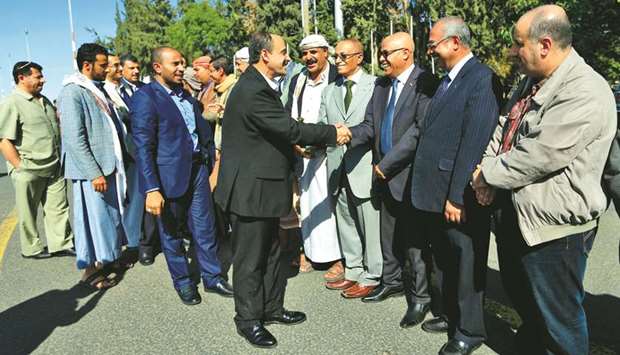UN special envoy Martin Griffiths yesterday called for the urgent creation of a strong monitoring mechanism in war-ravaged Yemen, one day after fighting parties agreed to a ceasefire at a vital port.
Yemen’s warring factions accepted at UN-brokered talks in Sweden on Thursday a truce on Hodeidah port, a key gateway for aid and food imports to a country where 14mn people stand on the brink of famine.
“A robust and competent monitoring regime is not just essential. It is also urgently needed,” Griffiths told the UN Security Council, adding that “allowing the UN the lead role in the ports is the vital first step.” He said Yemen’s warring parties told him they would welcome the monitoring and called for them to allow it “within days.”
Under the agreement, an “immediate ceasefire” should go into effect in Hodeidah and its three ports upon signing, followed by a “mutual redeployment of forces...
to agreed upon locations outside the city and the ports.”
The UN will play a “leading role” in management and inspections at the ports, which have been under rebel control for four years.
Eventually, Hodeidah will be under the control of “local security forces” — a term the rival parties disagree on.
The “UN will take on a leading role in supporting Yemen Red Sea Ports Corp in management and inspections at Hodeidah, Salif and Ras Issa,” Griffiths said.
Diplomats said UN Secretary General Antonio Guterres may propose a surveillance mechanism comprising 30 to 40 observers.
Some countries could send observers on a reconnaissance mission before the formal adoption of a resolution, diplomats said.
One diplomat suggested Canada and the Netherlands could field the observers.
Griffiths said Retired Dutch general Patrick Cammaert, who has previously worked for the UN in the Democratic Republic of Congo, had agreed to head the UN’s future oversight mechanism in Yemen.Cammaert is expected “in the middle of next week in the region,” Griffiths said.
According to a diplomatic source, a monitoring mechanism at Hodeidah “can work.” “Is it going to work? We don’t know,” the diplomat said. The possible deployment of observers comes after an attempt at something similar in the Syrian city of Aleppo in 2017.In that case, observers had to eventually retreat.
But unlike now, the fighters in that arrangement had not been stakeholders in the process, the diplomat noted.
UN humanitarian chief Mark Lowcock has for months been warning of a worsening situation in Yemen and says the UN is asking for $4bn to help suffering Yemenis next year.
“Millions of Yemenis still desperately need assistance and protection,” he said.

Members of the Houthi delegation (left) returning from peace talks in Sweden shake hands with supporters upon their arrival at Sanaa International Airport in the Yemeni capital, yesterday.
